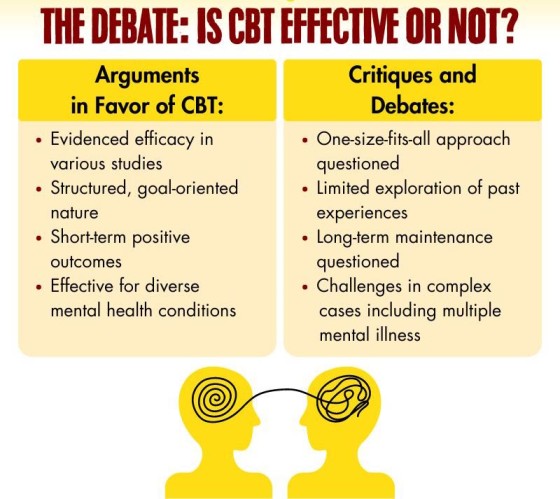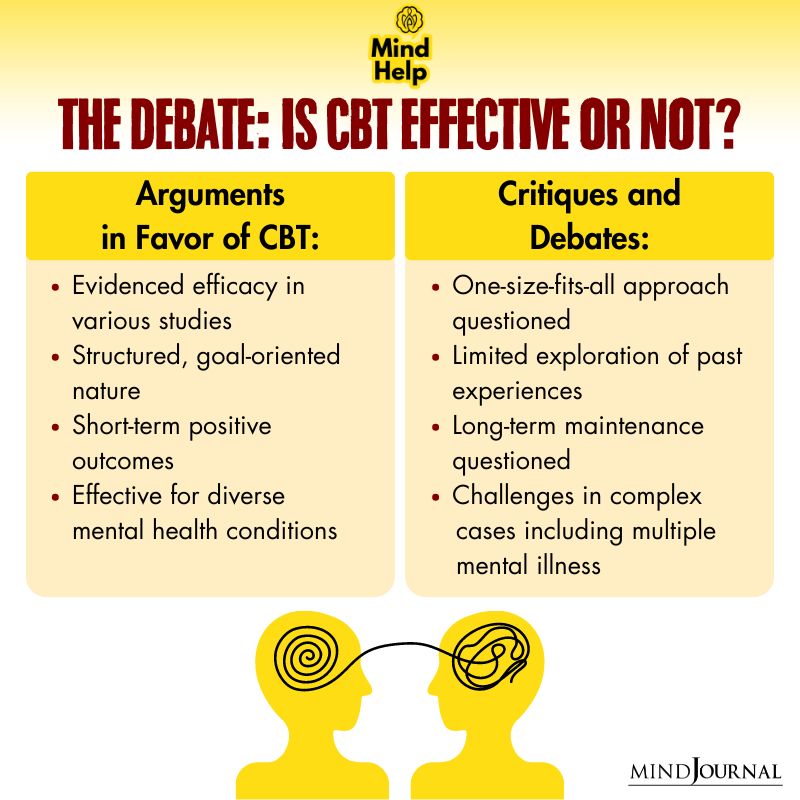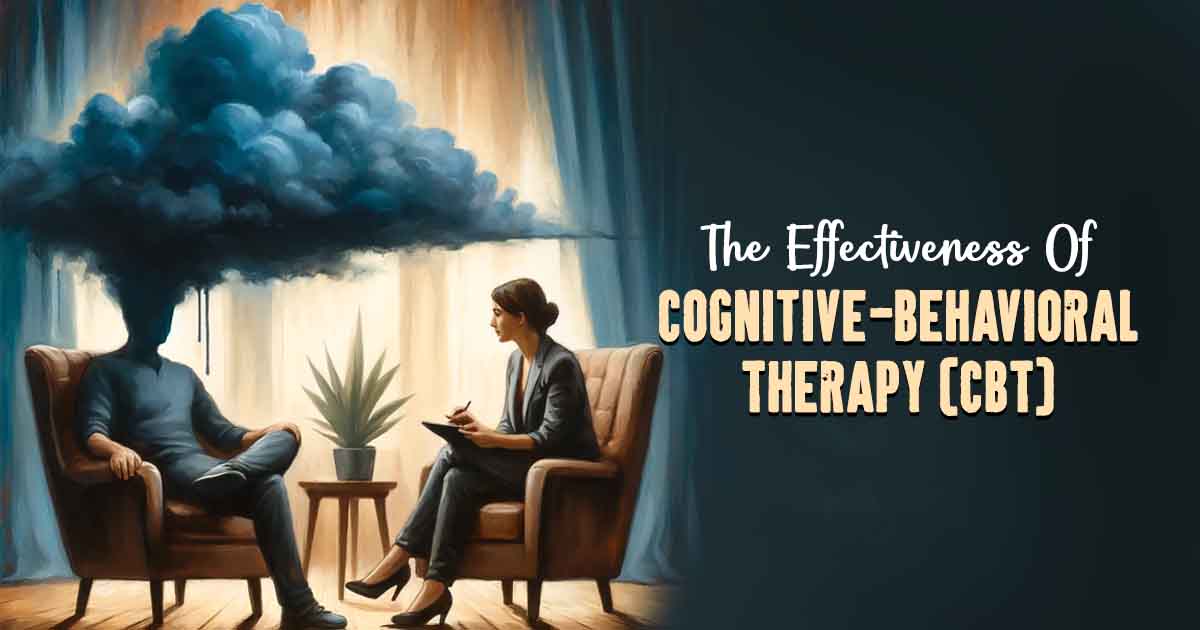Cognitive-behavioral therapy is generally considered a short-term, goal-oriented therapy that focuses on the present rather than delving extensively into past experiences. The effectiveness of cognitive-behavioral therapy lies in the fruitful collaboration between the therapist and the individual 1 David, D., Cristea, I., & Hofmann, S. G. (2018). Why Cognitive Behavioral Therapy Is the Current Gold Standard of Psychotherapy. Frontiers in psychiatry, 9, 4. https://doi.org/10.3389/fpsyt.2018.00004 to identify and modify negative thought patterns and behaviors that contribute to mental health symptoms.
Cognitive-behavioral therapy (CBT) is widely recognized as an effective and evidence-based treatment 2 Chand, S. P., Kuckel, D. P., & Huecker, M. R. (2023). Cognitive Behavior Therapy (CBT). National Library of Medicine; StatPearls Publishing. Available from: https://www.ncbi.nlm.nih.gov/books/NBK470241/ for a variety of mental health conditions, such as:

- Depression: CBT has been shown to be effective in treating depression by helping individuals identify and change 3 Gautam, M., Tripathi, A., Deshmukh, D., & Gaur, M. (2020). Cognitive Behavioral Therapy for Depression. Indian journal of psychiatry, 62(Suppl 2), S223–S229. https://doi.org/10.4103/psychiatry.IndianJPsychiatry_772_19 negative thought patterns and behaviors.
- Anxiety Disorders: CBT is commonly used to treat various anxiety disorders 4 Otte C. (2011). Cognitive behavioral therapy in anxiety disorders: current state of the evidence. Dialogues in clinical neuroscience, 13(4), 413–421. https://doi.org/10.31887/DCNS.2011.13.4/cotte , including generalized anxiety disorder, panic disorder, social anxiety disorder, and specific phobias. It helps individuals manage and overcome excessive worry and anxiety.
- Post-traumatic stress disorder (PTSD): CBT, especially in the form of trauma-focused CBT 5 Kredlow, M. A., Szuhany, K. L., Lo, S., Xie, H., Gottlieb, J. D., Rosenberg, S. D., & Mueser, K. T. (2017). Cognitive behavioral therapy for posttraumatic stress disorder in individuals with severe mental illness and borderline personality disorder. Psychiatry research, 249, 86–93. https://doi.org/10.1016/j.psychres.2016.12.045 , is often used to treat PTSD by helping individuals process and cope with traumatic experiences.
- Obsessive-Compulsive Disorder (OCD): CBT, particularly exposure and response prevention (ERP) 6 Gragnani, A., Zaccari, V., Femia, G., Pellegrini, V., Tenore, K., Fadda, S., Luppino, O. I., Basile, B., Cosentino, T., Perdighe, C., Romano, G., Saliani, A. M., & Mancini, F. (2022). Cognitive-Behavioral Treatment of Obsessive-Compulsive Disorder: The Results of a Naturalistic Outcomes Study. Journal of clinical medicine, 11(10), 2762. https://doi.org/10.3390/jcm11102762 , is a recommended and effective treatment for individuals with OCD.
- Eating Disorders: CBT has been adapted for the treatment of eating disorders 7 Kaidesoja, M., Cooper, Z., & Fordham, B. (2023). Cognitive behavioral therapy for eating disorders: A map of the systematic review evidence base. The International journal of eating disorders, 56(2), 295–313. https://doi.org/10.1002/eat.23831 such as bulimia nervosa, binge-eating disorder, and anorexia nervosa.
- Insomnia: CBT for insomnia (CBT-I) 8 Rossman J. (2019). Cognitive-Behavioral Therapy for Insomnia: An Effective and Underutilized Treatment for Insomnia. American journal of lifestyle medicine, 13(6), 544–547. https://doi.org/10.1177/1559827619867677 is a structured program that addresses the cognitive and behavioral factors contributing to sleep difficulties.
- Substance Use Disorders: CBT is often used as part of substance abuse treatment 9 McHugh, R. K., Hearon, B. A., & Otto, M. W. (2010). Cognitive behavioral therapy for substance use disorders. The Psychiatric clinics of North America, 33(3), 511–525. https://doi.org/10.1016/j.psc.2010.04.012 to help individuals identify and change problematic thought patterns and behaviors related to substance use.
- Chronic Pain: CBT is sometimes used to help individuals manage and cope with chronic pain 10 Scott W. (2019). Cognitive-behavioural therapy for chronic pain: determining what works for the person in front of you. British journal of pain, 13(1), 4–5. https://doi.org/10.1177/2049463718820054 by addressing the psychological and behavioral aspects of pain perception.
Read More About Chronic Pain Here
The Debate: Is CBT Effective Or Not?

The effectiveness of cognitive-behavioral therapy (CBT) is a continual point of debate in the mental health community. While numerous studies 11 Thase, M. E., Kingdon, D., & Turkington, D. (2014). The promise of cognitive behavior therapy for treatment of severe mental disorders: a review of recent developments. World psychiatry : official journal of the World Psychiatric Association (WPA), 13(3), 244–250. https://doi.org/10.1002/wps.20149 support its efficacy for various conditions, critics express concerns about its one-size-fits-all approach 12 Hofmann, S. G., Asnaani, A., Vonk, I. J., Sawyer, A. T., & Fang, A. (2012). The Efficacy of Cognitive Behavioral Therapy: A Review of Meta-analyses. Cognitive therapy and research, 36(5), 427–440. https://doi.org/10.1007/s10608-012-9476-1 , suggesting that its structured and goal-oriented nature may not be universally suitable. Questions also arise about the long-term maintenance of therapeutic gains 13 Thomas N. (2015). What’s really wrong with cognitive behavioral therapy for psychosis?. Frontiers in psychology, 6, 323. https://doi.org/10.3389/fpsyg.2015.00323 , with some studies indicating potential symptom relapse after CBT cessation. Additionally, applying CBT to complex conditions, such as severe personality disorders or deep-seated traumas, presents challenges, prompting calls for more nuanced therapeutic approaches in these cases.
Availing The Effectiveness Of Cognitive-Behavioral Therapy In Daily Life
Consider the following tips 14 Lopez, M. A., & Basco, M. A. (2015). Effectiveness of cognitive behavioral therapy in public mental health: comparison to treatment as usual for treatment-resistant depression. Administration and policy in mental health, 42(1), 87–98. https://doi.org/10.1007/s10488-014-0546-4 for availing the effectiveness of cognitive-behavioral therapy in daily life:
1. Set Clear Goals:
Identify specific, achievable objectives for therapy. Clearly outline what changes you want to make in your daily life.
2. Active Participation:
Actively engage in sessions. Practice exercises and techniques outside of therapy to boost the effectiveness of CBT sessions.
3. Consistent Attendance:
Attend scheduled sessions regularly. Maintain open communication with your therapist.
4. Open Communication:
Share thoughts and feelings openly with your therapist. Discuss any concerns or challenges you’re facing.
5. Implement Learned Skills:
Apply coping skills and strategies learned in therapy to real-life situations. Practice new behaviors consistently.
6. Journaling:
Keep a journal to track thoughts and behaviors. Reflect on patterns and progress.
7. Patience And Persistence:
Understand that change takes time. Persistently work on applying CBT principles in daily life.
8. Mindfulness Practices:
Incorporate mindfulness and relaxation techniques. Stay present in the moment, reducing stress and anxiety.
Read More About Mindfulness Here
9. Challenge Negative Thoughts:
Identify and challenge negative thought patterns. Replace irrational thoughts with more balanced ones.
10. Celebrate Achievements:
Acknowledge and celebrate small victories. Recognize progress, reinforcing positive changes.
11. Healthy Lifestyle:
Prioritize self-care, including exercise and adequate sleep. Maintain a balanced and healthy lifestyle.
12. Adaptability:
Be open to adapting therapeutic techniques to fit your unique needs. Collaborate with your therapist to refine strategies.
13. Seek Support:
Build a support network with friends and family. Share your therapeutic journey with trusted individuals.
14. Self-Reflection:
Regularly reflect on your emotions and reactions. Identify triggers and explore root causes that are hindering the effectiveness of CBT.
15. Follow-Up Sessions:
Attend follow-up sessions as recommended. Discuss long-term strategies for maintaining progress.
16. Continual Learning:
Stay informed about CBT principles and techniques. Continue learning and applying new skills beyond formal therapy.
Read More About Therapy Here
Takeaway
Cognitive-behavioral therapy (CBT) stands as a well-established and widely researched mental health treatment, individual responses may vary. Its effectiveness is supported by extensive research, yet some individuals may find greater benefit from alternative therapies or a combination of approaches.
The quality of the therapeutic relationship and the individual’s commitment to the process are crucial factors influencing CBT’s success. In making treatment decisions, it is essential to consult with mental health professionals, considering the specific needs and characteristics of each individual for a tailored and effective approach to mental well-being.
At A Glance
- Cognitive-Behavioral Therapy (CBT) is a widely recognized, effective, and evidence-based treatment for mental health conditions.
- The effectiveness of cognitive-behavioral therapy is evident in mental illnesses like depression, anxiety disorders, PTSD, OCD, eating disorders, insomnia, substance use disorders, and chronic pain.
- While CBT’s efficacy is supported by substantial research, ongoing debates exist around its one-size-fits-all approach, short-term focus, and long-term durability of therapeutic gains.
- Tips for availing the effectiveness of cognitive-behavioral therapy include setting clear goals, active participation, consistent attendance, open communication, etc.
- The decision to pursue CBT should involve collaboration with mental health professionals, considering individual needs for personalized treatment.















